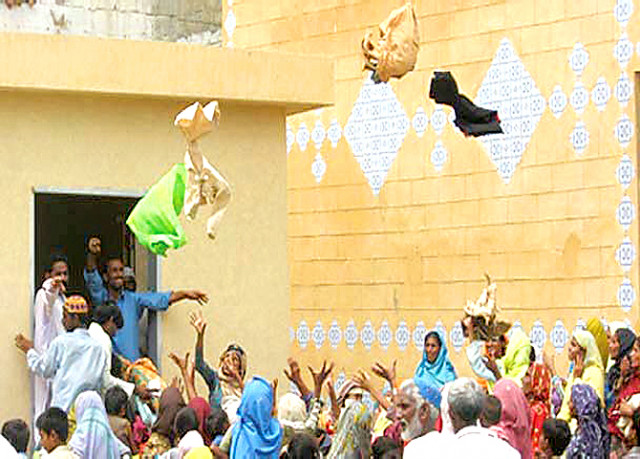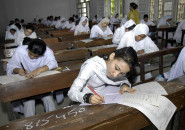Fishing for money
Where millions have lost everything in the floods, there are some who have benefited – at the expense of survivors.

As thousands of Internally Displaced People (IDPs) head to Karachi from Jacobabad, Dadu, Ghotki, Sukkur, Kashmore, Larkana and Shikarpur, transporters are exploiting the fact that people do not have too many options.
With little or no government relief coming their way, families in camps at Chakra Goth in Korangi and Gizri are at a loss when asked about their future plans. “I didn’t imagine I would end up like a beggar in Karachi. I was far better off in my village in Thal, Jacobabad,” says Ghulam Nabi who had to sell all his assets to raise Rs30,000 for the truck that brought his family of six and 40 other relatives to Karachi.
With friends like these
Most private transporters in the villages of tehsil Thal are from the Jakhrani tribe and known by the IDPs. Despite this, they refused to bring the fares down in this time of need. Many IDPs are bitter, and understandably so.
“We don’t care if you and your family don’t board, there are many more waiting in line,” Nabi was told by a driver. “I had no choice but to sell my livestock and request my wife to sell her gold bangles. I have never felt so helpless in my life.”
Fares for private inter-city buses in Karachi have also increased. At a bus stand in Saddar, a transporter Ameen has no qualms admitting he earned Rs75,000 from one passenger bus running between Jacobabad and Karachi. The regular bus fare between the two cities – situated at a distance of 555 kilometres – is between Rs500 and Rs600. However, people escaping the floods were forced to pay between Rs1,500 to Rs2,000 for a ticket.
Justifying the price hike, Ameen argues: “We’re not only spending on fuel; our drivers also risk our vehicles in floodwaters that damage wheels and other parts and have to be replaced.”
“My jewellery was worth Rs100,000 but I sold it for Rs20,000 to a trader in our area because I urgently needed the money to come to Karachi,” says Ghulam Sakina, an IDP who has taken shelter at the camp in Gizri. She says there was no one to check or question this exploitative practice.
One possession, though, which IDPs did not part with are cell phones. “How could we sell this?” says Nabi, reaching into his pocket to take out his phone. “This is our only lifeline.”
Tarred with the same brush
It is not just the transporters who are trying to make money at this time. According to the IDPs from Jacobabad, traders at the unaffected end of the district ran their businesses late into the night, benefiting from desperate customers. Many bought livestock at well below their value as those evacuating were forced to sell their cattle. “They were our assets. We are absolutely empty-handed now,” says 55-year-old Pervez Aman.
Aman also complains of not being given adequate warning. “There was one government bank and four private ones in our district but all of them stopped functioning several hours before we received news of the flood. This means the authorities had been informed well in advance but they did not bother warning us villagers.”
Even Jacobabad’s district government admits that though a warning was issued well in advance, some remote villages could not be informed in time. They say arrangements are now in place to evacuate those left behind.
“Since road links have been suspended, special trains between Sukkur, Khairpur and Karachi are being run to facilitate villagers,” chairman Provincial Disaster Management Authority, Ghulam Ali Pasha, tells The Express Tribune. “In fact, C-130s are also being sent to rescue those stranded in Jacobabad and shift them to Karachi, Hyderabad and Jamshoro.”
Roti, makaan but no kapra
Unfortunately, conditions at many of the relief camps are making IDPs wonder whether leaving their homes was the right decision. Several who were earlier dropped at one of the six government relief camps in Razzakabad on the outskirts of Karachi say that they did not receive any help for two days after which most of them shifted to a makeshift camp in Gizri, where private donors are providing them with food.
“We have proper shelter in this school and ample food as well, but we don’t have clothes,” says Sakina. “I have been wearing this shalwar kameez for a week now.”
Scenes at the Chakra Goth camp were a bit different. Though private donors were giving clothes, they were tossing them in the air rather than distributing them properly. “This is no way to deliver goods!” says Shahida who has come from Larkana. “All I got is this kameez, but I don’t know where the shalwar and dupatta are.”
Camp administrator Nazir Dewro says these are common complaints because, according to him, it is difficult to organise the people. “They refuse to line up when goods arrive. As a result, some receive nothing, while others get more than they require.”
Flood of profit
A similar situation can be witnessed in camps along Ghotki, Sukkur, Khairpur and Jamshoro, informs Zulfiqar Shah, the executive director of an NGO, Institute for Social Movement Pakistan, that is working to help flood survivors in Hyderabad.
In Hyderabad and Jamshoro too, there are complaints about hoarders and reports of markets running out of medical supplies, Shah’s field officers told him.
Some even suspect hoarders of posing as relief workers. They allege that the hoarders show up at different locations in the city to collect goods that they can later sell.
Some donors told The Express Tribune that they do not trust all camps collecting supplies. “I receive at least ten messages from unidentified numbers every day, asking me to ‘donate generously’. But why should I trust them? I don’t even know who these people are nor have I heard about their NGOs,” says an irked citizen.
Meanwhile, various businesses, including small hotels, near relief camps in Karachi are doing good business as officials estimate that the number of IDPs will exceed 30,000 in the next few days.
“The influx of IDPs in my area has meant more business for me that I otherwise could have imagined in Ramazan,” says Abdul Zaman, the owner of a flour mill near a camp in Chakra Goth, Korangi. The camp houses nearly 360 people.
Zaman says that due to the high demand he has temporarily increased the price of flour from Rs40 per kg to Rs50-55 per kg. “When disaster strikes, people from the urban areas are among the first to offer aid and we are here to help them…but at some point business must get back to business: making money.”
Published in The Express Tribune, August 19th, 2010.



















COMMENTS
Comments are moderated and generally will be posted if they are on-topic and not abusive.
For more information, please see our Comments FAQ